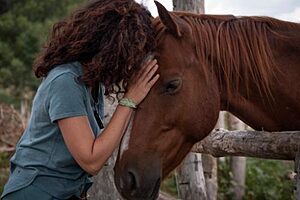
Alternative treatments can serve as a valuable complement to traditional treatments for addiction, such as behavioral therapy, medication-assisted treatment, and psychoeducational groups. At Texas Recovery Center, we use a holistic approach to equine-assisted therapy in Texas treatment to help our patients heal and change our treatment methods to fit each patient’s needs. Aside from our evidence-based addiction treatment modalities, we offer you activities and services to enhance your treatment experience, including equine-assisted therapy in Texas learning. One of our most popular addiction therapy programs is our equine therapy program in Texas.
Our Texas Recovery Center team has seen that working with horses provides healing for many people in recovery. If you or someone you care about is interested in Texas equine-assisted learning as part of an addiction treatment plan, contact our team at 888.298.5468 or connect with us online.
How Working with Horses Can Benefit Addiction Recovery
Equine therapy, or horse-assisted therapy, offers a unique approach to addiction recovery. By working with horses, patients can develop a range of useful skills and qualities that aid in their recovery journey. Horses are highly intuitive creatures, and their reactions often mirror the emotions or behaviors of the person working with them, fostering a heightened sense of self-awareness in patients.
Additionally, the act of caring for a horse, including tasks such as grooming and feeding, can cultivate feelings of responsibility and empathy, crucial traits in maintaining a sober lifestyle. The physical aspect of equine therapy, whether riding or working in the stables, also provides therapeutic exercise, which is known to improve mood and reduce stress.
In the calm and serene environment of the stables, patients can experience a sense of tranquility and focus, allowing them to confront and process difficult emotions in a safe and supportive setting. This, in turn, helps to strengthen resilience and emotional regulation skills, equipping them with the tools to manage their addiction in the long term.
What to Expect in an Equine Therapy Program
Some people may find it daunting to interact in such close proximity with a large animal. Horses are very gentle and patient creatures. Please be advised that we will never make you do something that you are uncomfortable with, and you will always be closely supervised by individuals who are highly trained and familiar with horses. Also, it is crucial for you to realize that you do not need any prior experience or training with horses to take part in this activity.
During the course of our equine-assisted learning sessions, you will spend one-on-one time with the horse. You will have the opportunity to groom, feed, and exercise the horse. Though simple, these activities are essential to the horse’s well-being in a capacity that might remind you of the fundamental nature of your own self-care. It can be empowering for some to be responsible for another creature’s welfare. Perhaps your addiction has depleted your self-confidence and sense of self-worth. Having an opportunity to be in control and in communication with these gentle beasts may make you more grounded and centered in who you are.
Benefits of Equine Activities in Texas
Just a few of the many advantages of equine-assisted therapy include:
- Increased self-awareness and emotional regulation
- Improved communication and relationship-building skills
- Enhanced empathy and sense of responsibility
- Reduced stress and improved mood through physical exercise
While these benefits are not exclusive to equine therapy, the unique setting and interactions with horses can provide a powerful and transformative experience for those in addiction recovery. Plus, it offers a welcome change from traditional talk therapies and group sessions.
Call Today for Equine Therapy at Texas Recovery Center
Your recovery matters. With our equine therapy program in Texas, you can find new ways to heal and grow as an individual. To learn more about our holistic approach to addiction treatment at Texas Recovery Center or to speak with a member of our team about enrolling in our equine-assisted therapy program, please reach out today by calling 888.298.5468 or connecting with us online.







